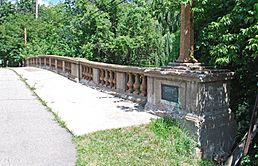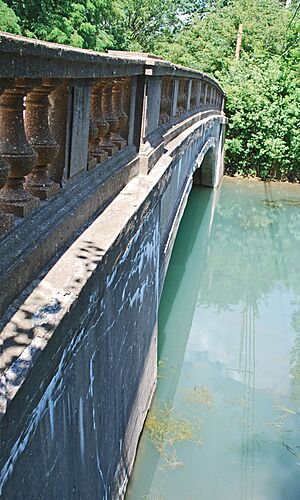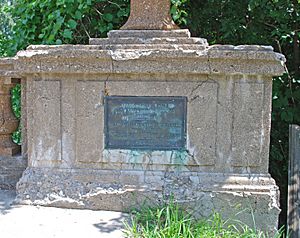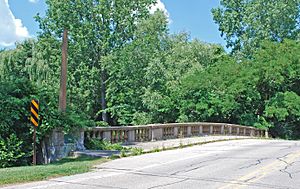Parke Lane Road–Thorofare Canal Bridge facts for kids
Quick facts for kids |
|
|
Parke Lane Road–Thorofare Canal Bridge
|
|

East side of bridge
|
|
| Location | Parke Lane Rd. over Thorofare Ch., Grosse Ile, Michigan |
|---|---|
| Area | less than one acre |
| Built | 1929 |
| Built by | Gossner and Flynn |
| Architect | Wayne County Road Commission |
| Architectural style | concrete arch bridge |
| MPS | Highway Bridges of Michigan MPS |
| NRHP reference No. | 00000043 |
| Added to NRHP | February 4, 2000 |
The Parke Lane Road–Thorofare Canal Bridge is a special bridge in Grosse Ile, Michigan. It crosses the Thorofare Canal. This bridge was added to the National Register of Historic Places in 2000. This means it's an important historical landmark.
Contents
Bridge History: From Old to New
Around the early 1900s, Grosse Ile Township built a bridge here. It was a swing bridge, which means it could swing open. This allowed boats to pass through the Thorofare Canal.
By 1929, the old bridge was getting very old and weak. More cars and heavier vehicles were using the road. The lightweight swing bridge was no longer strong enough. So, in 1929 and 1930, the Wayne County Road Commission built a new one. They replaced the old bridge with the strong concrete bridge we see today.
Later, the bridge was damaged and had to be closed for a while.
What Makes This Bridge Special?
The Parke Lane Road–Thorofare Canal Bridge is 99 feet long. That's about the length of three school buses! Its main section is 51 feet long and 36 feet wide.
Unique Design: Cantilevered Arch
This bridge has a very special design called a "cantilevered concrete arch." Most arch bridges are one big curve. But this bridge is different. It's made of two half-arches. Each half sticks out from one side of the canal. Think of it like two arms reaching out to meet in the middle.
A flat section, 18 feet long, connects these two "arms." If you look closely at the sides of the bridge, you can see where these two main parts meet.
Bridge Details and Decorations
Along each side of the road, there's a concrete fence. This fence is called a balustrade. It has cool, urn-shaped spindles, which are like small decorative posts. At each end of the bridge, there are octagonal lamp stands. These once held lights. The concrete used for the spindles has small orange pebbles mixed in. This gives them a unique color and texture.
Why This Bridge is Important
This bridge is important for a few reasons. It shows the great work of the Wayne County Road Commission's engineers. They designed a bridge that looks good and fits well with the area. It's also a rare example of the unusual cantilevered-arch design. This makes it a significant part of bridge history.






